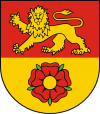 Nowe Miasto Lubawskie, Nowe-Miasto. 53°25' N 19°36' E, 99.5 miles NW of Warszawa. This town on river Drwęca with a 2004 population of 11,104). Nowe Miasto Lubawskie is the capital of Nowe Miasto powiat in the Warmian-Masurian Voivodeship since 1999. Normal 0 The first Jewish cemetery established at the end of the eighteenth century near the moat near today's ul. Sienkiewicza was filled and could not be expanded. The new cemetery established in 1885 on land on a rectangular 0.44 ha on the present ul. Grunwaldzka contained a mortuary-caretaker dwelling. Destroyed by the Nazis during WWII, even in 1948 recent graves could be found. Those later were used as paving for the detention buildings and the court. In 1995, during pavement renovation next to the court, gravestones were found and secured. The city and the Nissenbaum Family Foundation intend to move them to the cemetery. photos. photos. [June 2009]
Nowe Miasto Lubawskie, Nowe-Miasto. 53°25' N 19°36' E, 99.5 miles NW of Warszawa. This town on river Drwęca with a 2004 population of 11,104). Nowe Miasto Lubawskie is the capital of Nowe Miasto powiat in the Warmian-Masurian Voivodeship since 1999. Normal 0 The first Jewish cemetery established at the end of the eighteenth century near the moat near today's ul. Sienkiewicza was filled and could not be expanded. The new cemetery established in 1885 on land on a rectangular 0.44 ha on the present ul. Grunwaldzka contained a mortuary-caretaker dwelling. Destroyed by the Nazis during WWII, even in 1948 recent graves could be found. Those later were used as paving for the detention buildings and the court. In 1995, during pavement renovation next to the court, gravestones were found and secured. The city and the Nissenbaum Family Foundation intend to move them to the cemetery. photos. photos. [June 2009]
NOWE MIASTO LUBAWSKIE: (I) US Commission No. AS 165
(Alternate name: Neumark in W Preussen) Nowe Miasto Lubawskie is located in region Toninskie at 53º2519º36, about 90 km from Toninio. The cemetery is located in Tomasza Square (formerly Thomasplatz in German), at the corner of Sienkiewiczo (formerly: Genichtstrasse in German) i 25-Lecio PRI (formerly: Lindenstrasse in German). Present town population is 25,000-100,000 with fewer than 10 Jews.
- Town: mgr. Jan Jeda-burmistr-Rynek, tel. 2715.
- Regional: mgr. Mirostawo Romaniszyn-Konserwator Wojewodaki-87100 Torun, ul Lazienna 8, tel. 26692.
- Interested: Urzad Miejski-wyokiou geodezyi.
The earliest known Jewish community was 1816. 1921 Jewish population was 33 among the 3901 inhabitants. Effecting the Jewish community were (1) 1858- receiving of the statute; (2) 1857/1858- building of the synagogue at then Synagogenstrasse, now Kazimierza Wilhiego Street; and (3) departure of the majority of local Jews from town after W.W.I. Living here were (1) Kasper Danolshut, Hermahn Cohn, Abraham Hirsch, Wolf Schild-members of the community board, 1921; (2) Efraim Kowadio, cantor and religion teacher, 1921; (3) Leiba Feigebaum-ritual slaughterer, 1923; (4) Kanol Hirsch and Alexander Itzig-members of the community board, 1923; and (5) Myzen Ivebrnik-Rabbi, 1930. The Orthodox Jewish cemetery was established by the end of the 18th Century. The last known Jewish burial was in the 1870s. The isolated urban flat land has no sign or marker, no wall, fence, or gate. Reached by turning directly off a public road, access is open to all. No tombstones are visible. No known mass graves or structures. The municipality owns site used for recreation. Properties adjacent are residential. The cemetery was vandalized during W.W.II.
mgr. Mancha Stocka, ul. Lyskowskiego 37E / 185, 87-100 Torun visited site and completed survey on Oct. 24, 1991. The staff of the Municipality in Nowe Miasto Lubawskie was interviewed.
NOWE MIASTO LUBAWSKIE (II): AS 166
(formerly Chaussee nach Bratian in German). The cemetery is located on ul. Gen. Swierczwskiego. The Orthodox Jewish cemetery was established in the 1880s. The isolated urban slightly raised ground has no sign or marker, no wall, fence, or gate. Reached by turning directly off a public road, open to all. No tombstones are visible. No known mass graves or structures. The municipality owns site used for recreation. Properties adjacent are residential. The cemetery was vandalized during W.W.II.
mgr. Mancha Stocka, ul. Lyskowskiego 37E / 185, 87-100 Torun visited site and completed survey on Oct. 24, 1991. Scientific and historical documentation was used. The staff of the Municipality in Nowe Miasto Lubawskie were interviewed.
